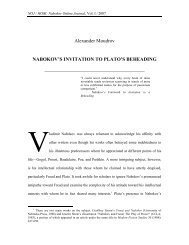domesticated translation: the case of nabokov's translation of alice's
domesticated translation: the case of nabokov's translation of alice's
domesticated translation: the case of nabokov's translation of alice's
Create successful ePaper yourself
Turn your PDF publications into a flip-book with our unique Google optimized e-Paper software.
N. Vid. “Domesticated Translation”<br />
<strong>the</strong> earth like potatoes. Nabokov uses <strong>the</strong> verb “vykapyvat’” (“to dig out”), conveying <strong>the</strong><br />
absurdity <strong>of</strong> <strong>the</strong> servant’s action.<br />
Ano<strong>the</strong>r pun appears in <strong>the</strong> Mouse’s story when she declares that “<strong>the</strong> patriotic<br />
archbishop <strong>of</strong> Canterbury found it advisable.” The Duck does not understand what <strong>the</strong><br />
Mouse means and asks her what exactly <strong>the</strong> archbishop found. The Mouse becomes<br />
angry and replies that <strong>the</strong> archbishop found it, sarcastically asking <strong>the</strong> Duck if he knew<br />
what this could mean. The Duck says: “I know what 'it' means well enough, when I find a<br />
thing, it’s generally a frog or a worm. The question is, what did <strong>the</strong> archbishop find?” In<br />
order to locate a distinctive equivalent <strong>of</strong> this pun, Nabokov used a word-play based on a<br />
possible confusion <strong>of</strong> <strong>the</strong> words “otnosheniia” (“relationships”) and “otnosit’” (“to carry<br />
<strong>of</strong>f”). Thus, <strong>the</strong> Mouse declares that <strong>the</strong> relationship (“otnosheniia”) between <strong>the</strong> Grand<br />
Prince and his bro<strong>the</strong>rs has been aggravated, and <strong>the</strong> Duck replies that he knows what it<br />
means because he <strong>of</strong>ten carries (“otnosit”) worms or frogs to his children.<br />
STYLE-LEVEL<br />
The outstanding characteristic <strong>of</strong> Alice is its lexical and syntactical simplicity.<br />
Nabokov did not change <strong>the</strong> style-level into a colloquial-childish tone which would have<br />
been unacceptable for Alice although it could have been more easily comprehended by<br />
Russian children. His changes in <strong>the</strong> text do not result in simplification. An example <strong>of</strong><br />
this is a passage from <strong>the</strong> first chapter. The original passage starts with <strong>the</strong> words:<br />
“‘Well’ thought Alice to herself; ‘After such a fall as this […]’.” Nabokov translates <strong>the</strong><br />
word “well” as “odnako” which is archaic and is <strong>of</strong>ten used in literary texts, stressing
















